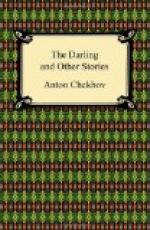“It’s not a question of pessimism or optimism,” I said irritably; “its simply that ninety-nine people out of a hundred have no sense.”
Byelokurov took this as aimed at himself, was offended, and went away.
III
“The prince is staying at Malozyomovo, and he asks to be remembered to you,” said Lida to her mother. She had just come in, and was taking off her gloves. “He gave me a great deal of interesting news . . . . He promised to raise the question of a medical relief centre at Malozyomovo again at the provincial assembly, but he says there is very little hope of it.” And turning to me, she said: “Excuse me, I always forget that this cannot be interesting to you.”
I felt irritated.
“Why not interesting to me?” I said, shrugging my shoulders. “You do not care to know my opinion, but I assure you the question has great interest for me.”
“Yes?”
“Yes. In my opinion a medical relief centre at Malozyomovo is quite unnecessary.”
My irritation infected her; she looked at me, screwing up her eyes, and asked:
“What is necessary? Landscapes?”
“Landscapes are not, either. Nothing is.”
She finished taking off her gloves, and opened the newspaper, which had just been brought from the post. A minute later she said quietly, evidently restraining herself:
“Last week Anna died in childbirth, and if there had been a medical relief centre near, she would have lived. And I think even landscape-painters ought to have some opinions on the subject.”
“I have a very definite opinion on that subject, I assure you,” I answered; and she screened herself with the newspaper, as though unwilling to listen to me. “To my mind, all these schools, dispensaries, libraries, medical relief centres, under present conditions, only serve to aggravate the bondage of the people. The peasants are fettered by a great chain, and you do not break the chain, but only add fresh links to it—that’s my view of it.”
She raised her eyes to me and smiled ironically, and I went on trying to formulate my leading idea.
“What matters is not that Anna died in childbirth, but that all these Annas, Mavras, Pelageas, toil from early morning till dark, fall ill from working beyond their strength, all their lives tremble for their sick and hungry children, all their lives are being doctored, and in dread of death and disease, fade and grow old early, and die in filth and stench. Their children begin the same story over again as soon as they grow up, and so it goes on for hundreds of years and milliards of men live worse than beasts— in continual terror, for a mere crust of bread. The whole horror of their position lies in their never having time to think of their souls, of their image and semblance. Cold, hunger, animal terror, a burden of toil, like avalanches of snow, block for




